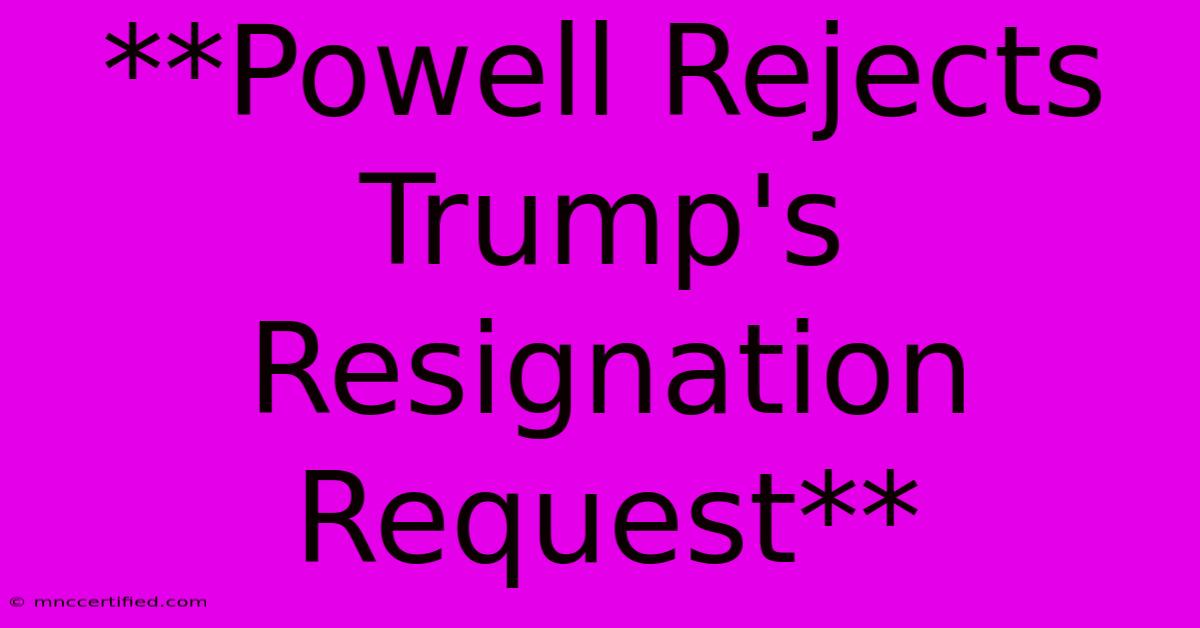**Powell Rejects Trump's Resignation Request**

Table of Contents
Powell Rejects Trump's Resignation Request: A Power Struggle Unfolds
The ongoing political drama surrounding former President Donald Trump took a dramatic turn on [insert date] when news broke that he had requested the resignation of Federal Reserve Chair Jerome Powell. However, in a move that sent shockwaves through Washington, Powell firmly rejected Trump's request, highlighting a significant power struggle between the executive and independent branches of government.
Trump's Motivation: A Controversial Attempt to Influence Monetary Policy
Trump's demand for Powell's resignation stemmed from his dissatisfaction with the Federal Reserve's monetary policy, particularly its interest rate hikes aimed at curbing inflation. The former President, known for his unorthodox economic views, believed that the Fed's actions were hurting the economy and hindering his re-election chances.
Trump's request was widely seen as an attempt to influence the Fed's independence and steer its policies in a direction that would benefit his own political agenda. This raised concerns among economists and political observers about the potential erosion of the Fed's autonomy, a cornerstone of a healthy and stable economy.
Powell's Stand: Upholding Independence and Economic Stability
Powell, a Republican appointed by Trump himself, stood firm against the pressure, rejecting the resignation request and reiterating his commitment to upholding the Fed's independence. In a statement, Powell emphasized the Fed's commitment to price stability and maximum employment while acting without political influence.
Powell's decision to stand his ground is seen as a bold move that safeguards the integrity of the central bank and its role in managing the nation's economy. His stance reinforces the principle of separation of powers, ensuring that monetary policy remains free from political interference.
The Fallout: A Power Struggle and Political Tensions
The confrontation between Trump and Powell has intensified the ongoing power struggle between the President and the Federal Reserve, raising fundamental questions about the role of the Fed in a democratic society.
The incident further underscores the deep political divisions that have characterized recent years in the United States. It remains to be seen how this power struggle will unfold and what long-term implications it might have for the economy and the country's political landscape.
Key Takeaways:
- Trump's request for Powell's resignation was an attempt to influence the Fed's monetary policy and erode its independence.
- Powell's rejection of the request reaffirms the Fed's commitment to price stability, maximum employment, and independence from political pressure.
- The incident highlights the importance of the Fed's autonomy and the potential dangers of political interference in monetary policy.
The ongoing political drama surrounding the Federal Reserve and its leadership is sure to continue, with far-reaching consequences for the U.S. economy and its political landscape.

Thank you for visiting our website wich cover about **Powell Rejects Trump's Resignation Request** . We hope the information provided has been useful to you. Feel free to contact us if you have any questions or need further assistance. See you next time and dont miss to bookmark.
Featured Posts
-
Southland Dental Insurance Phone Number
Nov 08, 2024
-
Ran Over Tire Tread On Highway Insurance
Nov 08, 2024
-
Do Compounding Pharmacies Take Insurance
Nov 08, 2024
-
Commercial Tow Truck Insurance Companies
Nov 08, 2024
-
Bail Bonds That Take Car Titles Near Me
Nov 08, 2024